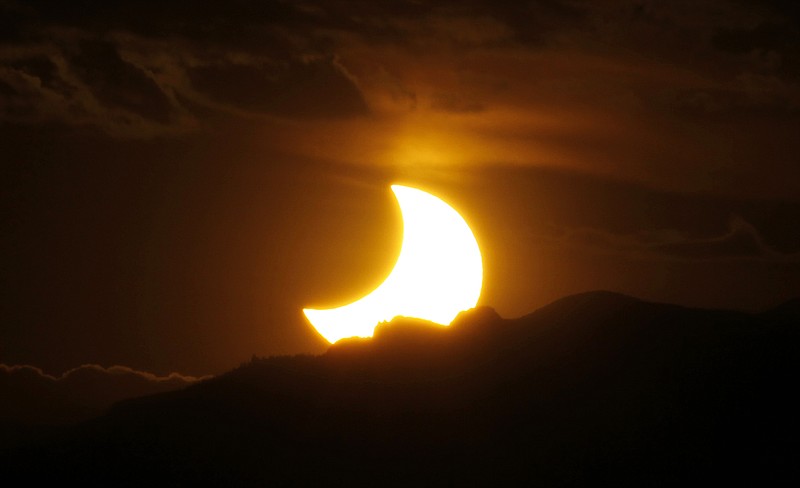ST. LOUIS (AP) - Hundreds of thousands of visitors are expected to trek to Missouri next month, all to soak in less than three minutes of darkness.
A total solar eclipse really isn't that rare - one occurs every 1-3 years when passage of the moon completely blocks the sun, casting a shadow on Earth. But it is often seen only in remote places like the Antarctic.
The eclipse on Aug. 21 cuts diagonally from Oregon to South Carolina, offering coast-to-coast viewing for the first time since 1918. Missouri will offer some of the best places to watch as day briefly becomes night.
You'll need to leave the big cities for the best view. St. Louis and Kansas City aren't directly in the so-called "path of totality," the 60- to 70-mile-wide prime viewing area. Organizers in dozens of smaller communities are getting ready for their day out of the sun.
"This is our Super Bowl," said Beth Conway, spokeswoman for the visitors bureau in St. Joseph, where up to 500,000 might show up. "We are basically being told this is our only chance to bring in that number of people."
The eclipse will appear first in northwest Missouri at 1:06 p.m. and cut diagonally to the southeast corner of the state. The length of total darkness will vary, depending on proximity to the center of the path. Missouri offers some of the nation's longest blackouts.
Ste. Genevieve, a Mississippi River town about 60 miles south of St. Louis, will have 2 minutes and 40 seconds of darkness, and nearby Perryville 2:34. Darkness will last 2 minutes and 38 seconds at St. Joseph, and more than 2 minutes at mid-state places like Marshall, Columbia and Jefferson City.
Across the state, hotel rooms are sold out, residents are renting out homes and parks are being turned into campsites to accommodate visitors. No one knows how many people will show up. Projections range from 320,000 to 1.3 million, according to the Missouri Division of Tourism.
"We're getting people from Europe, Asia," Trey Propes of the Missouri Hotel and Lodging Association board said. "It's a once in a lifetime impact for the entire path."
St. Joseph's 78,000 residents are being warned that with so many out-of-towners will make getting around on Aug. 21 difficult, gas and food could sell out and cellphone service could be overloaded.
"We're urging people to prepare like it's going to be an ice storm in August," Conway said.
In Jefferson City, at least 50,000 people are expected for the "Capital Eclipse Celebration" that will include a live broadcast by NASA and the space agency's traveling "Journey to Tomorrow" exhibit.
"We're one of the few state capitols on the path of totality," said Katherine Reed, spokeswoman for the Jefferson City Convention and Visitors Bureau. "The sun will be almost directly over the dome of the capitol so it's going to be a really cool site."
The eclipse comes on the first day of fall classes at Southeast Missouri State University in Cape Girardeau. About 2,000 children from across the region are expected to join university students and watch from the football stadium, with a variety of educational opportunities planned.
"Science is a difficult topic to engage students in," said Debbie Below, a university vice president who chairs the eclipse planning committee. "This is a fun way to do it."
More than 40 state parks and historic sites also are hosting eclipse-watch events. Among them is the Katy Trail, where 500 bicyclists will ride 36 miles from Rocheport to Jefferson City, stopping to view the phenomenon along the way.
Those who somehow miss the eclipse will get their next chance on April 8, 2024, when another total solar eclipse crosses over the Midwest.

